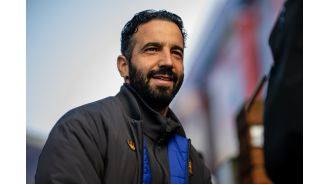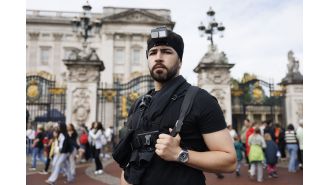This article was produced for ProPublica’s Local Reporting Network in partnership with WPLN/Nashville Public Radio. Sign up for Dispatches to get stories like this one as soon as they are published.
Tennessee’s Governor Calls for Expanding a Gun Dispossession System Already Failing Domestic Violence Victims
After the Covenant School shooting, Gov. Bill Lee went beyond state Republicans in calling for reform. But the system he is embracing already allows violent people to hold on to their weapons.

The first time Tennessee’s Republican governor stood at the podium in the wake of the mass shooting at the Covenant elementary school last month, he was flanked by GOP lawmakers. They touted school “hardening” measures, including hiring more armed guards and strengthening entry points.
A week later, Gov. Bill Lee stood alone. He called for something rare in a Second Amendment-friendly state like Tennessee: gun-control measures. The violence had struck close to home, taking the life of six victims, including a close family friend of the governor’s.
“I’m asking the legislature to bring forth thoughtful, practical measures,” Lee said. “To strengthen our laws, to separate those dangerous people from firearms, while at the same time preserving the constitutional rights of the people of this state.”
Republican lawmakers pushed to end their legislative session early rather than take up his proposals. Lee responded within hours by saying he would force legislators to return to the Capitol for a special session.

But the problem with the governor’s proposal is more than just political. The approach he landed on would expand a system already in use in Tennessee — one that has allowed guns to slip through the cracks with deadly consequences.
A 13-page draft of Lee’s proposal lays out how the new process of separating a dangerous person from their guns would work.
If someone had concerns that a person was a threat to themselves or others, they would be able to alert law enforcement, which could ask the courts for what Lee is calling a “temporary mental health order of protection.” The gun owner would hold onto their gun but would be required to attend a hearing within 10 days. Before appearing in court, they would undergo an assessment for suicidal or homicidal ideation.
The court would then decide whether to issue the order, which would instruct the gun owner to surrender their guns for 180 days.
The governor says his proposal would be an expansion of a system that exists for domestic violence victims, put in place in 2009, which allows victims of domestic violence and stalking to indicate if their abuser has a gun and allow a court to decide whether the weapon must be surrendered. Under Lee’s proposal, this process would be available to the general public, beyond just family or dating relationships.
On paper, the proposal does provide broader coverage. But in practice, Tennessee’s current gun dispossession process has a significant and sometimes dangerous loophole, which kicks in immediately after an abuser is ordered to give up their guns. While other states require guns to be turned over to law enforcement, Tennessee allows someone to give their guns to a third party, like a friend or a relative. That’s the most common outcome in Tennessee, but a rarity in the rest of the country — about a dozen states allow third-party dispossession.
Those other states have a patchwork of rules that help ensure that the weapons are safely turned over to a third party, including identifying who received the gun, bringing the recipients to court to explain their responsibilities or even holding them liable if the gun ends up in the wrong hands.
Tennessee hasn’t adopted any of those practices, and the state doesn’t require the third party to be identified in paperwork.
The state also has no mechanism to ensure that the gun is actually ever turned over to that third party at all. Instead, the system trusts that a person who is abusing their partner will keep their word and surrender their weapons. The gun owner is supposed to fill out an affidavit indicating how they dispossessed, but domestic violence advocates say that form rarely gets filed with the court.
“Then everything falls apart,” said Linda McFadyen-Ketchum with the gun control advocacy organization Tennessee Moms Demand Action. “There’s no follow-through to see if people really did dispossess. Where are the guns? Who did you give them to?”

The consequences of this system can be dire. Tennessee, like most states, keeps no record of how many people are killed by guns that the perpetrator should not have had. But Nashville’s Office of Family Safety, a division within the city government that works with domestic violence survivors, does keep track.
Their numbers provide a limited glimpse, over just a few years, into the death toll of the flawed system.
From 2018 to 2020 in Nashville, 27 people died in domestic violence shootings. The office used court records to find that roughly half of the perpetrators of domestic violence gun homicides were prohibited from having access to a weapon at the time of the shooting. They could have been barred because of a domestic violence charge, an order of protection, a felony conviction or their age.
Marie Varsos lost her life to that loophole. She filed an order of protection against her estranged husband, Shaun, in 2021 and told law enforcement and the courts that he had a gun and threatened to kill her with it.
Shaun Varsos was ordered to dispossess and said in a hearing that he was giving his guns to his parents — utilizing the third-party loophole.
Less than a month after Marie Varsos sought an order of protection, Shaun Varsos used his guns to shoot and kill her and her mother, Debbie Sisco. Then, he shot and killed himself.
Marie’s brother, Alex Youn, believes that order likely just spurred Shaun to act.
“It only infuriates them,” Youn said. “And makes them even more angry and has the ability to set them off when an order of protection actually doesn’t have any teeth.”
Marie Varsos’ story fits into a broader picture in Tennessee — the state has one of the highest rates of women killed by men in the country. From 2018-20 there were nearly 300 domestic violence homicides in the state. Most were perpetrated with a gun, but there’s no record of how many were perpetrated with a gun that the shooter was not allowed to have.
The ReformLee’s proposal is similar to a “red flag” law, also known as an extreme risk protection order. Those laws can allow law enforcement to seize firearms.
Florida created a “red flag” law in the wake of the 2018 school shooting at Marjory Stoneman Douglas High School. Since then, judges in Florida have acted thousands of times to separate dangerous people from their guns.
But in a pro-gun-rights state like Tennessee, such reforms face fierce resistance. While recent polling has shown the majority of Tennessee voters support a “red flag”-style law, Lee was careful not to use that term. Leaders in the Republican legislature have described such a policy as a nonstarter — broadly opposing any laws that allow for someone’s guns to be taken away.
Instead, Lee wants to build on the widely accepted law that already exists for domestic violence victims. And to assuage Republican concerns, gun surrender would remain voluntary.
When reached for comment, Lee’s office didn’t address the specific problems with the current system but stated that the law could be strengthened and expanded during the legislative process.
Lee’s proposal does include some improvements to that system.
It instructs judges to bring the gun owner back to court within seven days if they fail to fill out paperwork indicating they gave up their firearms. And it requires proof of dispossession — though it doesn’t indicate what evidence would suffice.
Yet advocates think it does not go far enough, in large part because it still allows for guns to be given to an anonymous third party.
“If we’re going to allow third parties to have the firearms dispossessed to them, we need to know who that third party is,” said Becky Bullard of Nashville’s Office of Family Safety.
Bullard is one of many domestic violence advocates who has pushed for the legislature to fix the problems with Tennessee’s order of protection law in the past five years
So far, those efforts have been unsuccessful.
One attempt at reform came after Travis Reinking walked into a Nashville Waffle House and opened fire in 2018. He killed four people and injured several others. Reinking came from Illinois, where he had been ordered to give up his firearms because of prior offenses. He gave his guns to his father, yet one of those weapons was used in the shooting.
In the aftermath, Illinois tightened its dispossession processes. The criminal court sentenced Reinking to life in prison without the possibility of parole, but it also sentenced his father to 18 months for letting his son have access to weapons.
“Being able to do what Illinois did and hold that father accountable … is a really important safety mechanism if we’re going to allow third party dispossession,” Bullard said.
But when lawmakers and advocates like Bullard introduced a similar reform in Tennessee a year after the Waffle House shooting, it did not pass.
Now advocates are worried the Covenant School shooting may have the same outcome — another tragedy without meaningful reform.
This article was produced for ProPublica’s Local Reporting Network in partnership with WPLN/Nashville Public Radio. Sign up for Dispatches to get stories like this one as soon as they are published.
This article was produced for ProPublica’s Local Reporting Network in partnership with WPLN/Nashville Public Radio. Sign up for Dispatches to get stories like this one as soon as they are published.






